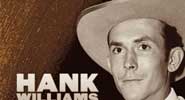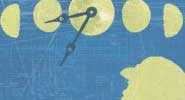-
Steven Stone
Bearfoot
The teenagers who began the Bearfoot Bluegrass Band in 2006 have matured into young adults. As they’ve matured, so has their music. Even their name has changed slightly; it’s been shortened to Bearfoot. The name change coincides with a change in personnel. Two of the original band members, mandolinist Jason Norris and singer/fiddler Angela Oudean,…
-
Steven Stone
Stacie Collins
Rev Records
The list of people who call themselves “professional harmonica players” certainly is not all that long. And the number of female harmonica players… well, beyond Stacie Collins, I can’t think of one. On her third CD, Collins demonstrates not only her ability to blow harp, but her songwriting, singing, and band-leading chops. Collins’ music is…
-
Steven Stone
Hank Williams: The Legend Begins
Time-Life
Just when you thought you had heard everything that Hank Williams ever committed to tape or shellac, Time-Life and the Williams estate comes up with something new. On their latest deluxe three-CD box they’ve even included the musical equivalent of a baby picture on a fur rug. Two of the three CDs in this box…
-
Steven Stone
Lonesome River Band
The Lonesome River Band has been around for 30 years. And while he wasn’t a founding member, banjo player Sammy Shelor is the de facto leader of the band by virtue of tenure. On their latest album, the band delivers the same driving sound that has made them fan favorites. The Lonesome River Band’s roster…
-
Steven Stone
Kentucky Thunder
Self-distributed
First, this Kentucky Thunder has nothing to do with Rickey Skaggs’ band. And instead of bluegrass, they serve up hot-buttered white Southern soul, a la Delaney and Bonnie. Since the band has four lead vocalists (Etta Britt, Vickie Carrico, Jonell Mosser and Sheila Lawrence – all of whom have angelic pipes), no song is carried…
-
Steven Stone
Scott Gibson
Self-distributed
Gibson It’s hard to toss a quarter in Nashville without hitting a songwriter holding a tip jar, but few have Scott Gibson’s songwriting chops. On Just Keep Drivin’, Gibson delivers 12 reasons he should be on your radar. Born inWaco, many of Gibson’s songs are stories aboutTexas; the title tune tells the tale of…
-
Steven Stone
The Grascals
Cracker Barrell Records
The Grascals understand that making music professionally is a business, and strategic partnerships are part of being successful. On The Grascals + Friends they partner with some of the biggest names in country music. Though known as a bluegrass band, the music here is more acoustic and electric country; partners include Brad Paisley, Dierks Bentley,…
-
Steven Stone
Greg Trooper
52 Shakes Records
Greg Trooper’s music displays a variety of influences – bluesy inflections from R&B coupled with rootsy country melodies and arrangements. On his latest release, he handles most of the acoustic guitar, with veteran guitar-slinger Michael McAdam adding slide and electric guitar. Co-produced by Trooper, keyboardist Kevin McKendree, and bassist Stewart Lerman, the album’s arrangements are…
-
Steven Stone
Nathan Stanley
Nathan Stanley Entertainment
On the cover of My Kind of Country, Nathan Stanley looks a bit like Elvis, with big sideburns, slicked-back hair, and shades. But unlike some Las Vegas clone, Stanley was born into bluegrass/ country royalty – he’s the grandson of Dr. Ralph Stanley – and served time with his grandfather’s band, The Clinch Mountain Boys.…
-
Steven Stone
Danny Schmidt
Red House Records
On his second Red House Records release, Danny Schmidt displays the same level of wit and lyricism that made his last release such an artistic success. Undoubtedly, Schmidt writes great songs. Man of Many Moons includes 10 new originals and one cover – “Bucket of Rain” by Bob Dylan. His version of this rarely covered…










